"A man ought to read just as inclination leads him, for what he reads as a task will do him little good."—Samuel Johnson
| Reviews | Limericks | Six Words | Buy Nothing |
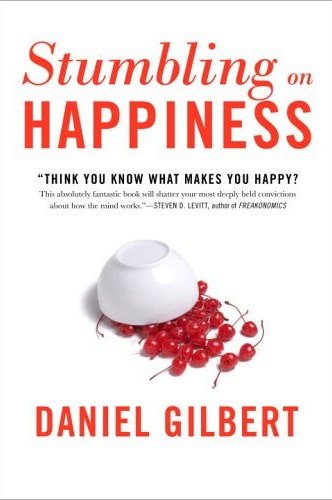 18 November 2006
18 November 2006
Stumbling on Happiness
Daniel Gilbert
If you liked Blink and its many cousins, and don't mind a snarky tone to your psychology, you'll gobble up this book about us wacky humans and why we do what we do. Gilbert looks particularly at how we imagine we'll feel in the future and how it usually isn't the way we really will feel. He has a lot of tricks up his sleeve, most of them on par with those children's games that ask over and over "What does s-p-o-t spell?” and then “What do you do at a green light?”—tripping you up because your brain is working exactly the way it has evolved to, and exactly the way that serves you best in 99.9% of the situations you encounter. He concludes that we should trust our own instincts less, that if we want to know what will make us happy we should look at what makes everyone else happy; we're not as unique as we think. Of course, part of being human is that we can't accept this advice. And why would we do what people tell us to if it turns out—as Gilbert asserts—that horrible experiences and huge mistakes, even self-created disasters, often change a life for the better? It's kind of comforting to know that maybe we can't screw up too badly. Like Malcolm Gladwell, Gilbert leaves his readers with at least as many questions as he answers. But his humor and his habit of explaining every idea thoroughly, and then explaining it again, go a long way toward make this an easy and fun read.
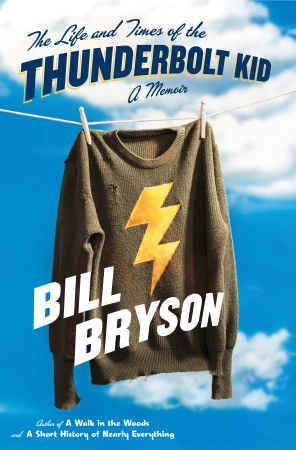 18 November 2006
18 November 2006
The Life and Times of the Thunderbolt Kid: A Memoir
Bill Bryson
The 1950s had segregation, McCarthyism, uncomfortable undergarments, and an astounding disregard for personal safety or health as the country plummeted headlong into a love affair with technology without pausing to think things through. Turns out it wasn't such a good idea to x-ray children's feet every time they needed new shoes. But the era's infatuation with the future was also terribly charming, whether it shows up in breathtaking world's fairs or such misguided ideas as mail delivery by missile. One feels a protective affection for mid-century Midwesterners; Bryson certainly does, even as he's poking fun at them. He's absolutely right to mourn the permanent loss of uniqueness in American cities; before the arrival of chain stores, every town had something nothing else had, even if it was something silly like a carousel for delivering groceries from store to car. This was an era when buildings were made with care, people hadn't yet been tricked into working longer hours to afford all of their labor-saving luxuries, and technology was opening up dazzling possibilities but not everything had become a profit-making venture. Much has been written about these cultural shifts elsewhere, of course, and this book is more about the childhood experience, anyway, or childhood as it was before it was overscheduled: long stretches of boredom that led to experiments like seeing what the world looks like viewed through lime Jell-O, and winter mornings spent doing nothing but taking boots on and off. Bryson, never one to let the truth stand in the way of a good story, is as funny as ever here.
More funny stories about growing up: Kick Me
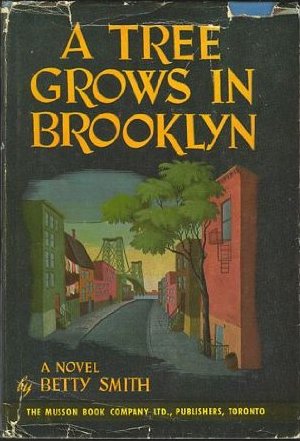 18 November 2006
18 November 2006
A Tree Grows in Brooklyn
Betty Smith
I know I read this book about an early-twentieth-century second-generation American girl when I was about that girl's age, but when I read it again not a word was familiar. I can only conclude that its rightful storage space in my brain is occupied by all of the words to the Diff'rent Strokes theme song and the transcript to the commercial for “Connect Four.” Smith's famous staple of middle-school reading lists is sweet and sincere enough for a child, but with a sharply honest streak. Francie, the heroine, isn't above selfishness, cruelty, or revenge, and Smith doesn't shy away from the sad or the ugly; she takes a dim view of human nature. Though it's a bit heavy on the editorializing, the precious period details of a bygone time (the book itself is already six decades old), and delightful but not sugarcoated family anecdotes make this coming-of-age story enjoyable for an adult.
Also about a girl growing up: A Complicated Kindness
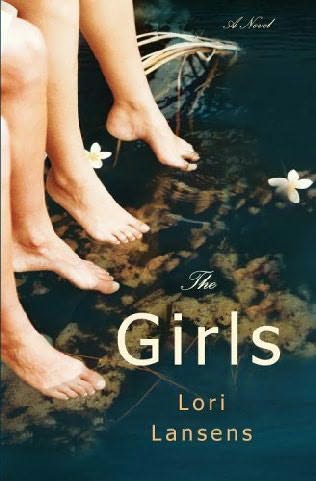 28 July 2006
28 July 2006
The Girls
Lori Lansens
Of all the unusual physical conditions human beings can be born with, possibly none affects one's identity the way being a conjoined twin does. With any other disorder, no matter how different your body is, it's still yours and only yours. Being permanently attached to another human being seems intolerable. But like many things, it depends on what you're used to, and people can adapt to extraordinary things and perhaps even see them as an advantage. I recently read about a trio of adult female triplets who share a single purse. They aren't physically attached, but they don't think of themselves as individuals to the degree that most of us do. In Lansen's beguiling novel, Rose, the physically stronger twin, carries her pretty, club-footed sister Ruby on her hip. Because they are joined at the head (separation would sever a crucial vein and kill them both), they've never looked into each other's eyes, but they are so close that one can feel the other blushing. The novel is their autobiography, written as they approach their milestone thirtieth birthday, and alternates between the voices of Rose and Ruby. Odd, yet convincing, this novel is much more readable than Darin Strauss's Chang and Eng. Rose and Ruby's lives are unusual but the issues they struggle with are universal: family, peers, sexuality, and death. Even the more mundane matters of life are colored by their condition; how do you plan a surprise party for your conjoined twin? Rose and Ruby are remarkable for their physical situation, but their stories and their unique personalities transcend it, even as they are inseparable from it. In Rose's words: "Ruby and I endure because of our connectedness. Maybe we all do. How can that be a curse?"
Also about an unusual physical condition: Long For This World
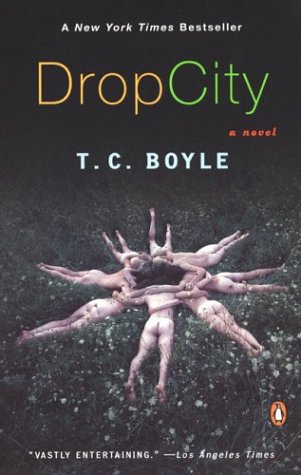 28 July 2006
28 July 2006
Drop City
T.C. Boyle
Boyle is remarkable. How can he not only publish novels as often as Woody Allen releases movies, but write in such vivid detail about so many different places and times? This time it's California in 1970. The hippies of Drop City get restless when their commune begins to fall apart (as communes are wont to do) and set off for Alaska. A band of feckless vegetarians intends to live off the land in the wilds of Alaska? This isn't going to be pretty. When they arrive, they run into Cecil and Pamela Harder, a couple just a bit older than they, who are the real counterculture dropouts (maybe even crunchy cons—see below), with the skills and determination to support themselves in the wild. I would have liked to hear a little more of the Harders' lives and a little less about the hippies, but I'm not complaining. Boyle is able to conjure up a story so convincing that it seems like reportage—he disappears entirely. Yet he writes classic novels, with heroes and villains, all seeming so real you'd swear they must be out there somewhere, living and breathing.
Also by Boyle: The Inner Circle
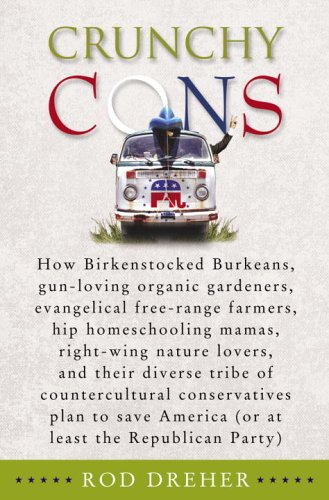 28 July 2006
28 July 2006
Crunchy Cons: How Birkenstocked Burkeans, gun-loving organic gardeners, evangelical free-range farmers, hip homeschooling mamas, right-wing nature lovers, and their diverse tribe of countercultural conservatives plan to save America (or at least the Republican Party)
Rod Dreher
Dreher realizes that those otherwise misguided liberals might be onto something with organic food, but his mean colleagues
at the National Review make fun of him when he goes to the farmer's market!
I'm with him on the idea that greed is the deadly sin that's strangling our country,
and that conservatives ignore it and even embrace it, choosing to condemn lust instead.
I don't understand his assertion that liberals believe in the perfectibility of humans,
as opposed to the existence of evil. Seems to me neither of those things exist—people are inherently fallible and always will be, but they're seldom "evil." Anyway, this isn't a book about ideas as much as aesthetics; Dreher talks a lot about how great old houses and fresh food are (no arguments there) and how junky our popular culture is (amen to that) but he doesn't talk much about his conservative beliefs. There are hints: "We have no problem with guns, except in the hands of criminals," says Dreher (but I assume he doesn't consider his two young children "criminals"), and he's a Roman Catholic and practitioner of "natural family planning." It's also hard not to notice his condescension to his wife when she points out that it's easy to be nostalgic about home-cooked meals if you aren't the one who would have to do the cooking. Rejecting the dominant culture for conservative—especially religious—reasons is nothing new (think of the Amish, or Orthodox Jews) but how is it that a hard-working, loving family with simple tastes is seen by our culture as requiring justification? Why is a "conservative" with "liberal" tastes baffling? Our black-and-white two-party political system and our rejection of substance in favor of sound bites render the Drehers' lives incomprehensible—and threatening. People like them, who know that cheap, new, and flashy don't make for a happy life, undermine our nation's current economic mission to make the wealthy as rich as possible at the expense of the poor—a mission that should shame any thoughtful conservative. May many more join them, before there are no old houses or small farms left.
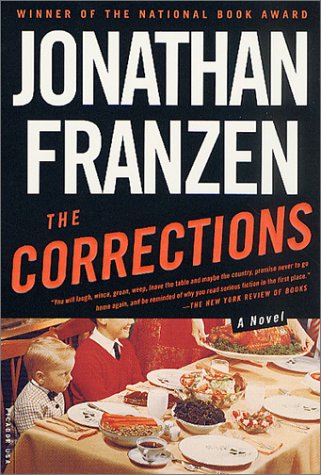 28 July 2006
28 July 2006
The Corrections
Jonathan Franzen
I'm a little late on this one, I know. I plead guilty to having judged a book by its cover: this one is packaged like a big box of cheap mashed potatoes. The Halloween color scheme and B-movie-title sans serif font are harsh enough, but the 1950s-ish family photo combined with the title put me in mind of “The Timbertoes,” the Highlights comic about speechless stick figures that was a soul-crushing bore for a child reared on The Electric Company. I did check the book out when it was published, but the very first sentence was a fragment, which set my teeth on edge, and flipping through I saw e-mail exchanges reproduced complete with address line—too trendy and annoying. I don't even like brand names in my fiction. But as each of Franzen's personal essays in The New Yorker held me in greater thrall, I realized I was likely missing out by not reading his acclaimed novel. And I was. This is a Big Book: up-to-the-minute modern, critical of our advertising and marketing-saturated culture, technologically savvy, yet marbled with fantasy and bizarre comedy, and, at its heart, a story of families. Franzen can even get into the mind of a child. He does his best to disprove Tolstoy's assertion; his unhappy family is far too similar to so many others I've seen. There are many ways to be a failure, though, and he shows us a few of them, tackling the many shades of schadenfreude, the ever-shifting balance of power in the complicated bargain of marriage, and the fine line between dignified and stubbornly foolish. I did have the uneasy feeling that at times he might be mocking his characters; he doesn't quite get close to them. But it's a great book, the kind that leaves echoes of language in your head after you've stopped reading it, the kind you can't wait to get back to.
Also by Franzen: Freedom
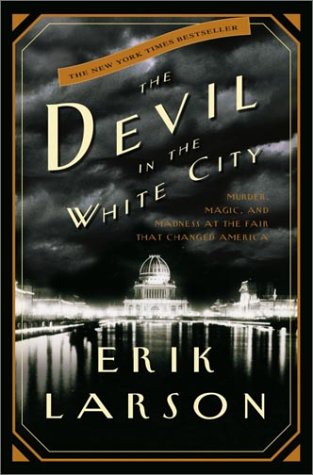 28 July 2006
28 July 2006
The Devil in the White City: Murder, Magic and Madness at the Fair That Changed America
Erik Larson
Late-nineteenth-century Chicago was a city eager to display its big shoulders, and when it won the honor of hosting the 1893 World's Fair the pressure was on to create a spectacle that would outshine the fair in Paris that introduced the world to the Eiffel Tower. Chicago was also a city whose shoulders were growing faster than its body could support; there were an average of four violent deaths a day, the air was filthy, and as young women streamed into the city for work it wasn't unusual for them to simply disappear. Most distressingly, the general sense was that the police wouldn't be much help at all if consulted. Larson brings together the story of the construction of the fair with that of a powerfully charismatic man who presents himself as a doctor named Holmes and proceeds to buy up an entire city block while conducting some nasty business in his homemade gas chamber. The book is clearly well researched, but the juxtaposition of the deeds of a murderous psychopath and the politics of architectural planning makes for a curiously tedious thriller. Just when the latest grisly crime is unfolding, we're back in a stuffy board room untangling red tape. Larson's prose leans toward the purple; does every break—and there's at least one on every page—have to end with the foreshadowing of doom? But this is a lively look at an interesting part of history, reminding us that the social order was once in some ways more frayed than it is now. The magic of a giant fair and its wide-eyed hopefulness for the future, as well as some extremely creepy true crime, will keep you turning the pages. Plus: find out the origin of the tune to “There's a place in France where the ladies don't wear pants.”
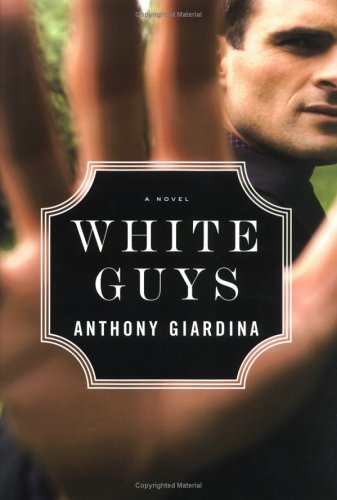 28 July 2006
28 July 2006
White Guys
Anthony Giardina
Five young men come of age in a working class suburb of Boston. Four go on to acquire powerful jobs, financial security, stable marriages, and overscheduled children, and one, Billy, thrown off track by a destructive impulse, doesn't make it out of his hometown. The four, who have maintained their bond over the years, return as adults to give Billy a boost into the upper middle class. But the transition doesn't quite take, and the friction results in tragedy. This novel was inspired by the Charles Stuart case of 1989, and the racial tension that the case ignited is present in this novel, but that's not where Giardina's heart is. He wants to tell a story of men, and of failure and success, and he succeeds in that. We may feel shut out of Billy's head, but we get to know Tim O'Kane, the narrator, and his discomfort with the comfortable life he doesn't feel he's earned. Giardina has combined his skill at delicate observations about suburban life, marriage, and children with a riveting succession of plot twists to create an all-around satisfying novel.
Stories by Giardina: The Country of Marriage
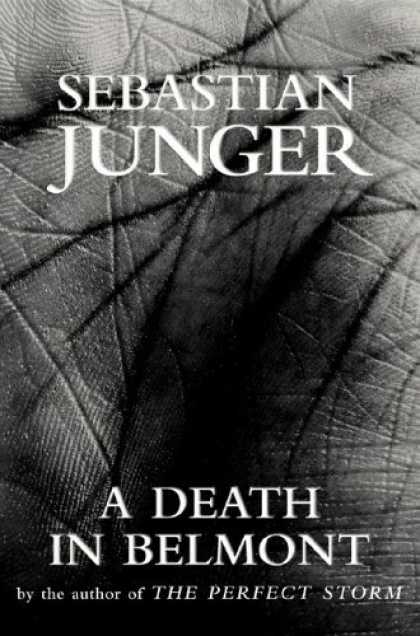 28 July 2006
28 July 2006
A Death in Belmont
Sebastian Junger
When Junger was an infant his mother hired a workman, Albert DeSalvo, who even at the time seemed a little too intense. One wonders—being that the city was in the grip of the Boston Strangler at the time—why she wasn't more wary of DeSalvo than she was. Then a neighborhood woman is sexually assaulted and murdered and a black handyman, Roy Smith, is sent to jail, while the Strangler continues to terrorize the city. Later, DeSalvo confesses to the being the Strangler. Both men died in prison in the 1970s. Could the Strangler have been guilty of the crime for which Smith, who insisted he was innocent, was sent to jail? Surely racism played a part in Smith's conviction, but the evidence that he was guilty of the crime is hard to refute. Was the Strangler DeSalvo, or someone else who was never caught? In any case, Junger and his family are very lucky to have only brushed up against this dark stain on the Boston's history. Not much is clear here, or ever will be, and Junger rightly acknowledges as much, making for a fair treatment, if one that doesn't quite pack a wallop.
More true crime: True Story
 28 July 2006
28 July 2006
Awake
Elizabeth Graver
I have a weakness for novels featuring unusual medical conditions. In this family, the younger boy has xeroderma pigmentosum, or XP, which means that his skin is extraordinarily sensitive to light. Living in a house with taped-over windows and home-schooling at night can be lonely. So when the family finds find Camp Luna, designed for XP kids and run by a warm widower, Max and his mom don't want to leave. Ian, the husband, is, of course, kind and understanding and basically flawless, which causes much breast-beating by his wife over how her betrayal of him is so very wrong, even while she's getting it on with the little camp man. I'm not spoiling anything; this is all obvious from the moment they meet. The writing is very pretty but seems to have been produced on autopilot: ethereal, effortless, and empty. A better book about a boy with a rare disease that ages him prematurely is Long for this World.
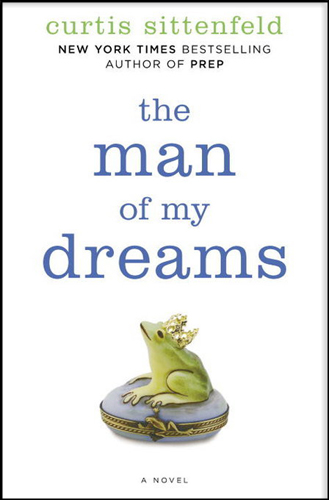 28 July 2006
28 July 2006
Man of My Dreams
Curtis Sittenfeld
Where Prep was a solid, fleshed-out novel, this is clearly some notes pulled from a drawer and thrown together to ride the crest of her first book's smash success. Hannah Gavener is even more obsessed with boys than Lee Fiora was—she thinks of nothing else. This may be what being a teenaged girl is like, but that doesn't mean it makes for enthralling reading. The one angle that Sittenfeld nails is the injustice of being dominated, which happens all too often to the young, single, and female; Hannah has to choose whether to endure shoddy treatment by her sister's slightly jerky boyfriend or object to it and be perceived as the jerk for doing so.
Also by Sittenfeld: American Wife
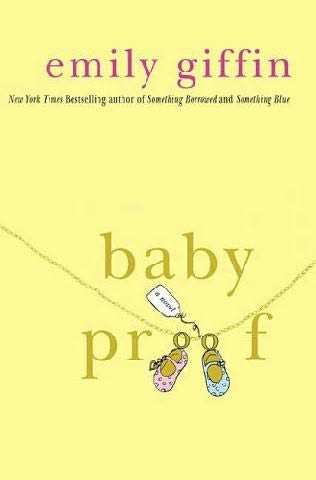 28 July 2006
28 July 2006
Baby Proof
Emily Giffin
Yuppies Claudia and Ben are married, comfortable in their glamorous careers in publishing and architecture and in their mutual disinterest in having children—until Ben changes his mind. So they divorce. But Claudia misses him. Getting flown to Italy by a sexy older publicist is fun and all, but it's not True Love. Might it be worth it to her to have a kid just to get her husband back? There's a scary thought. The book offers a few good lines, and some modern fun (obsessive Googling as oxygen for the flames of jealousy), but is mostly silly and forgettable.
Also by Giffin: Love the One You're With and Something Borrowed
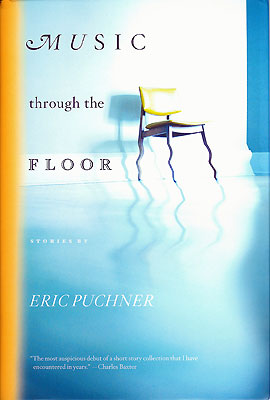 10 April 2006
10 April 2006
Music Through the Floor
Eric Puchner
Aimless young men, rickety marriages, and children of divorce are all shopworn staples of the modern short story, so it's a delight to find someone who can make something new and sparkly of them. This tasty little book surprised me like a story collection hasn't in a long time, making me gasp and laugh out loud. Puchner makes very subtle and complicated observations of human behavior: the ever-shifting allegiances, the difficulty of reading a person. You can skip the last story, a contemporary favorite cliché about the guy who teaches English as a second language and ends up learning more from his worldly-wise students than they learn from him, but the others are real gems.
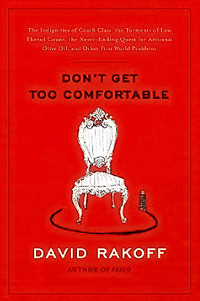 28 February 2006
28 February 2006
Don't Get Too Comfortable
David Rakoff
Striking perfectly a delicate balance of a biting wit and endearing charm, Rakoff is probably the best of the modern personal essay magazine writers. He visits Central Park with a modern-day hunter-gatherer, goes on a twenty-day fast, and explores plastic surgery, cryogenics, and gay Republicans, among other oddities. It's a look at The Way We Live Now, at least for a certain wealthy and smart segment of the world, or for the rest of us who want to escape there with an excellent tour guide.
"There was so much to read, for one thing, and so much fine health to be pulled down out of the young breathgiving air...I was rather literary in college—one year I wrote a series of very solemn and obvious editorials for the Yale News—and now I was going to bring back all such things into my life and become again that most limited of all specialists, the 'well-rounded man.' This isn't just an epigram—life is much more successfully looked at from a single window, after all."—F. Scott Fitzgerald, The Great Gatsby
Copyright © 1996–2026 So Much to Read
Contact: books at so much to read dot com